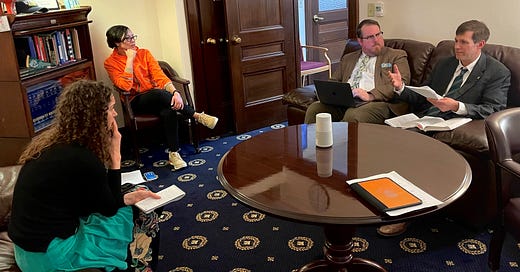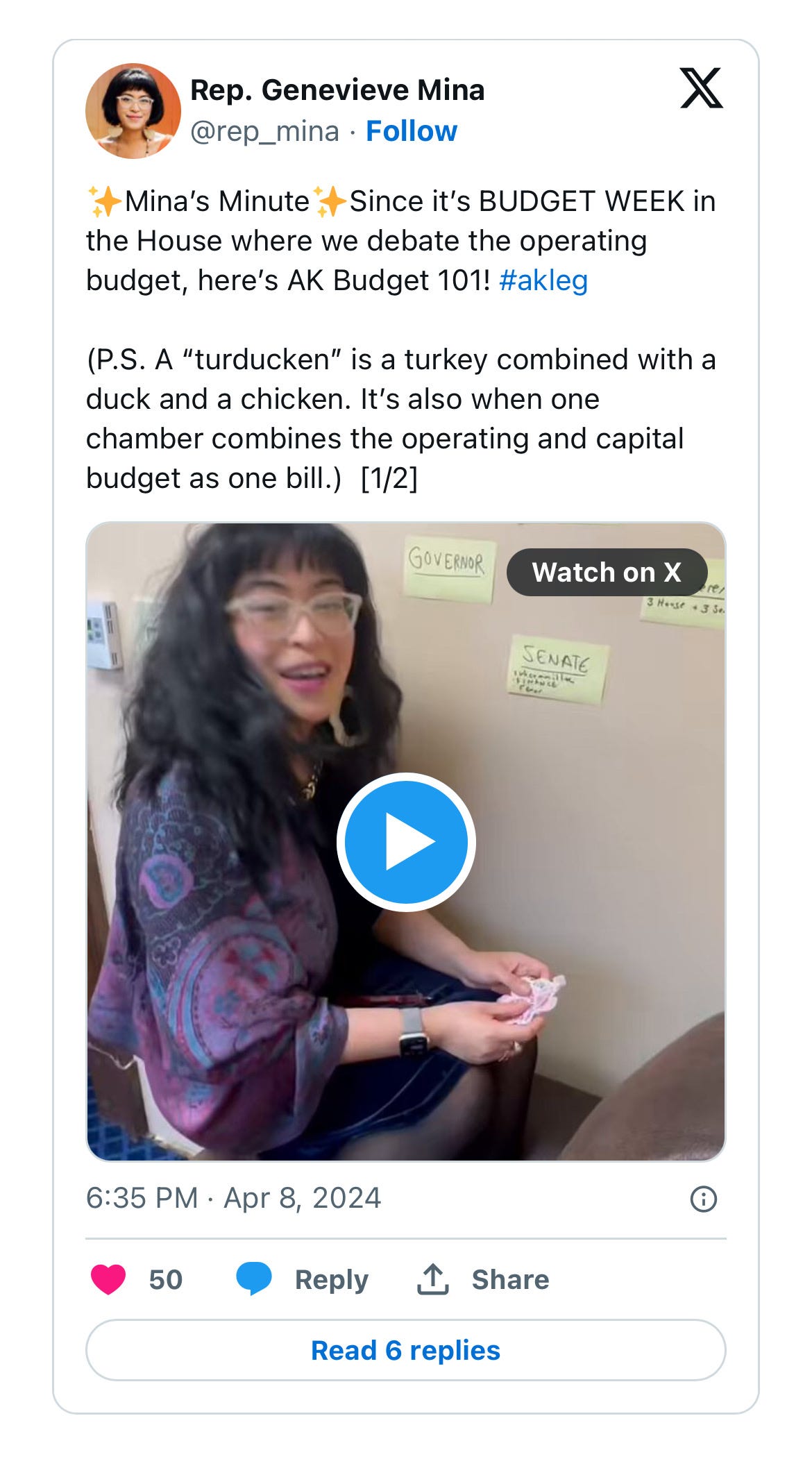The ugly, the bad, and hopefully, some good
Correspondence schools update, Maintenance of Equity compliance, the proposed budget, and more.
Dear Friends and Neighbors,
As we head into the last month of the legislative session, which is constitutionally limited to 121 days, there are a lot of things happening all at once in the halls of Juneau. Let me try and unpack them all for you.
Correspondence Schools
The origins of this update begin back in 2014 when then-Senator Mike Dunleavy successfully inserted unconstitutional correspondence school allotment language into a hotly debated omnibus education bill. Fast forward to last week (April 12, 2024) when a Superior Court judge ruled the 2014 correspondence school allotment language unconstitutional.
On Wednesday, I sent a letter on behalf of my colleagues on the Senate Education Committee to the Commissioner of the Alaska Department of Education and Early Development offering to assist in introducing legislation to fix the unconstitutional statutes.
“The members of the Education Committee in the Alaska State Senate welcome any statutory fixes the Alaska Department of Education and Early Development would like to introduce for consideration by the members of the Alaska State Legislature. The Senate Education Committee will prioritize needed fixes and move with all due haste to develop legislation for introduction and move it through the legislative process.” - Excerpt from a letter from the Senate Education Committee to DEED Commissioner Deena Bishop
This is an evolving issue, but the most important thing to remember is that Alaska’s public correspondence programs pre-date statehood. Although things are in flux, I am confident that Alaska’s robust system of public school choice will continue. Only this time, it will be in alignment with the Alaska Constitution.
Read the Alaska Beacon article describing Judge Zeman’s decision.

Maintenance of Equity
The origins of this issue facing public education date back to the Great Recession. At that time, multiple states reduced their overall state spending for public education in communities of high-poverty and who served high-need students greater than overall state spending for all other public schools.
In 2021, President Biden signed the American Rescue Plan into law, which included resources for America’s public schools to respond to the COVID-19 pandemic. The American Rescue Plan included a novel caveat that if statewide support for public education was reduced greater than the overall statewide reduction in statewide public education aid, specifically for larger school districts that serve high-need students or have significantly large populations of low to limited income residents (high-poverty), then the state would make up the difference.
This novel caveat is called Maintenance of Equity. Alaska was notified back in March 2023 that we had failed to meet the federal stipulation of Maintenance of Equity. Although the Alaska Department of Education and Early Development (DEED) has been working with the U.S. Department of Education, the issue has not been resolved. The state has been given until April 25, 2024 to comply with the federal mandate or at least show there is a plan to comply. If the Administration does not move forward with a plan to resolve this issue, the Alaska Senate Majority is prepared to insert the required $17 million in the proposed budget bill.

Budget Swap
Late last week, the House and the Senate performed the ceremonial swap of the proposed FY 2025 capital and operating budgets. The state budgeting process can confuse even the most dedicated local government wonks, so before I launch into my detailed explanation, let me hype my girl, Representative Mina’s April 8 Mina’s Minute where she - in less than a minute - breaks down the budget process.
Another great resource on how the state budgetary process works comes from the Legislative Finance Division. This simple step-by-step analysis is easy to follow and a quick glance will tell you we are on Step 7 of the process.
Last week, I was a yes vote on the FY 2025 Capital Budget. In working with my Finance Tri-Chairs, I worked to get several local district priorities included in the budget. We’re pretty happy to see support for our statewide library network, money for energy retrofitting at the Anchorage Museum, support for a pilot project at Covenant House, money for a downtown Indigenous gateway project, addressing financial needs to help improve neighborhood parks and trails, and dollars to fix some outstanding capital issues at the Anchorage Performing Arts Center.
Additionally, the FY 2025 Capital Budget prioritizes statewide deferred maintenance, University of Alaska major maintenance, and capital needs for our struggling K-12 public schools.
Now the House has an opportunity to evaluate the FY 2025 Capital Budget while the Senate works on the FY 2025 Operating Budget. Stay tuned for announcements on when public testimony will be noticed by the Senate Finance Committee on the FY 2025 Operating Budget. The House Finance Committee will take public testimony the proposed FY 2025 Capital Budget this afternoon from 1:30 to 3:00 pm. You can testify at your local Legislative Information Office or by calling the legislature’s teleconference system. You can also submit written public testimony to housefinance@akleg.gov.
Anchorage: 907-563-9085
Juneau: 907-586-9085
Other: 1-844-586-9085 (Toll-free)
Budget Breakdown with Your Host Mike Mason
Join Senator Löki Gale Tobin and your host, Mike Mason next Thursday, April 25th starting at 5:30 pm for a virtual Senate District I Constituent Meeting on the FY 2025 Operating and Capital Budgets. We’ll be breaking down the budget process and what’s funded in the upcoming fiscal year. If you’ve got a question about the budget, send it to us beforehand and we’ll get you an answer. Email Sen.Löki.Tobin@akleg.gov before 1 pm on Thursday, April 25th.





